SPFBO 7 – The Second Eliminations
Welcome to our Second Eliminations post for SPFBO 7.
This week, we have grouped our five brave entrants together into an “Epic” batch. You can find out more about this week’s posts in our Meet the Batch post. Read on to find out which three of them fell in our second batch of eliminations, listed in alphabetical order.
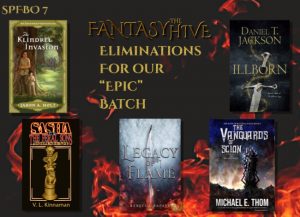
The Klindrel Invasion
by Jason A Holt
Theo:
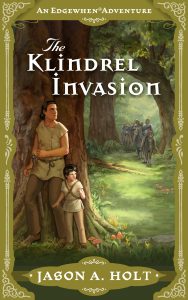 This is a bit different, and I sort of like the narrative style. It almost feels like a second person narrative because the sense you get is of a historian/storyteller telling the tale of the eponymous invasion from the point of view of its victims, the small brown skinned people of the Redwood valley. I pictured them as a bit like halflings, while the Klindrel are more human proportioned red skinned black haired people. The reader is cast in the role of a Redwood inhabitant, such that the narrator makes asides to explain what a chair is (unknown in their civilisation). The historian viewpoint also gives a kind of omniscient narration, where the story teller picks up the story from various points of view as allies of the Redwood valley people struggle to warn them of the impending invasion. There are interesting features of the worldbuilding but on the whole it is kept fairly incidental, for example the fact that two diminutive races of people in this land (those in the Redwood valley, and the chameleon like trading people – the Children of Wealth) use retractable ladders to mount full sized horses. The structure of the story telling, with its enigmatic chapter headings and asides to the reader/listener feels a bit like an 18th novel – a sort of Gulliver’s travels, or Robinson Crusoe. The author commits strongly to this style of storytelling. While the reflective set up suggests the Klindrel invasion is not going to be entirely successful (after all it is the winners who write the histories) there is enough to interest me in the fates of the diverse cast of characters, so I am keen to read on.
This is a bit different, and I sort of like the narrative style. It almost feels like a second person narrative because the sense you get is of a historian/storyteller telling the tale of the eponymous invasion from the point of view of its victims, the small brown skinned people of the Redwood valley. I pictured them as a bit like halflings, while the Klindrel are more human proportioned red skinned black haired people. The reader is cast in the role of a Redwood inhabitant, such that the narrator makes asides to explain what a chair is (unknown in their civilisation). The historian viewpoint also gives a kind of omniscient narration, where the story teller picks up the story from various points of view as allies of the Redwood valley people struggle to warn them of the impending invasion. There are interesting features of the worldbuilding but on the whole it is kept fairly incidental, for example the fact that two diminutive races of people in this land (those in the Redwood valley, and the chameleon like trading people – the Children of Wealth) use retractable ladders to mount full sized horses. The structure of the story telling, with its enigmatic chapter headings and asides to the reader/listener feels a bit like an 18th novel – a sort of Gulliver’s travels, or Robinson Crusoe. The author commits strongly to this style of storytelling. While the reflective set up suggests the Klindrel invasion is not going to be entirely successful (after all it is the winners who write the histories) there is enough to interest me in the fates of the diverse cast of characters, so I am keen to read on.
Belle:
I really struggled with The Klindrel Invasion. I didn’t feel connected to any of the characters, and I didn’t feel like the balance between setting up the plot/world and info dumping was well maintained. I think there’s a lot of potential in the rest of the book, once the set up is done, but I found it quite difficult to stay engaged enough to want to keep going. As others have mentioned, there’s a classic fantasy feel to the writing style, and unfortunately that’s not one I connect with at all.
Peter:
I am a huge proponent of epic fantasy, when I saw this book was included in our batch I was excited. It’s different as well, I enjoyed the choice of the narrative style which boarders on second person because this story is being told to you. This leads to the worldbuilding, which again was well handled, you get the point of view of a Redwood inhabitant. It has this historical viewpoint, where the story is picked up from various points of view. It’s a bold choice for the book and the author commits to this throughout, the story of two peoples at war was intriguing and I enjoyed the structure of the story. It just fell a bit short in terms of interest and this might be something to do with the omniscient narration, still a bold move by the author.
Scarlett:
The Klindrel Invasion is unlike any of the other novels in our assigned SPFBO batch in terms of writing style which becomes apparent within just a few lines of reading. As it has been pointed out by the others on the team, the narrative consists of an omniscient quality, which I have enjoyed in older fantasy writings and children’s novels before. Here is an example of what I mean from the story: “The year of the Klindrel Invasion, the Year of Blood and Famine, was written in the Klindrel counting system as 1500. You and I understand that this is merely an interesting numerical artifact created by an arbitrary choice of counting system. But the Klindrel do not think like us. To the Klindrel Emperor, the zeroes seemed filled with cosmological significance.“
The main storyline here is about the invasion of Klindrel and the dynamics between different clans and Children of Lith. In great detail are the people and history of Edgewhen described and compared to one another from physical attributes to belief systems, to education and so on, which was the book’s blessing and curse for me. Staying on track to follow the vein of the main storyline weighed down by layered facts, perspectives and historical info to sort out and keep track of, was somewhat tedious and slowed down the main flow. In general I am a lover of detail and enjoy fleshed out characters and worldbuilding, but they overpowered the storyline here for me with too much baggage. I did enjoy the setting and the overall “Hobbittesque” feel to it, which fit well with the omniscient style of telling old tales.
Calvin:
I’m a huge fan of epic fantasy, and so I was anxious to sink my teeth into The Klindrel Invasion. From the opening scene, this novel feels like an epic fantasy written in a sort of classic vein, the narrative voice is closest to an omniscient narrator–something far more common in fantasy written prior to the 1980s. There were some neat worldbuilding touches that I enjoyed. For instance, the narrative is from the perspective of small statured people, and so what we might consider normal height people are described as nearly giant. It’s a neat little bit of worldbuilding and there is some interesting use of tools and technology that goes along with this. Unfortunately, the story seemed overly info-dumpy to me, the omniscient narrator often choosing to tell us things rather than show things through character perspective. In addition, there were sometimes paragraphs of exposition to explain an historical point. It felt very much like a history book, and this may have been the author’s intention, but it didn’t work well for me. I also felt like the omniscient narration created quite a bit of distance between the reader and the characters. As a result, I didn’t feel like I really understood character motivations and, ultimately, just didn’t care about the characters.
Sasha of the Feral Sons: Adolescence
by V.L. Kinnaman
Theo:
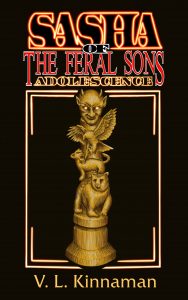 There are some interesting elements here, in that we have not so much an anti-hero as an anti-society, a nation of vampires with their own culture and customs. When they discuss the harvesting of “stock” you realise they are talking about humans as blood banks – farmed like dairy cattle. However, the humans are not dumb animals and do have their own nations and societies on the borders of the vampire nation, such that being exiled into the human lands is a dangerous fate for a vampire.
There are some interesting elements here, in that we have not so much an anti-hero as an anti-society, a nation of vampires with their own culture and customs. When they discuss the harvesting of “stock” you realise they are talking about humans as blood banks – farmed like dairy cattle. However, the humans are not dumb animals and do have their own nations and societies on the borders of the vampire nation, such that being exiled into the human lands is a dangerous fate for a vampire.
Which brings us to Sasha, the violent daughter of a king who – despite her small stature (it is never quite stated what age equivalence she has to humans, but contextual clues would put it somewhere around eight to ten years old?). Sasha’s obsession with killing her older brother forces her parents to seek out another home for her, while her brother’s resentment simmers. So that is where the opening 20% brings us. Kinnaman’s vampires have fangs and drink blood and have preternatural abilities which can be developed, but I am not sure how far they conform to other vampiric conventions (like daylight aversion etc).
There are interesting elements to the story, but there were a few aspects that didn’t fire my enthusiasm so well. The multiplicity of points of view that we meet early on was confusing and some characters seemed to have the role of camera – to show us the protagonist, rather than having a story in their own right. To be fair – by 20% the story seems to have condensed around identifiable key players. The formatting in my kindle version came through a little awry with section numbers sprinkled inside the text and there were some typo/grammar errors (council when counsel should have been used) and “incompetent” being misspelled. As a general observation, I know that it feels picky when we draw attention to details like formatting and grammar, and I’ve been on the receiving end of that kind of criticism and found myself wanting to scream “yeah, but what about the story? What did you think of the story?” but I have to say paying attention to those kind of details is simple professionalism and self-published authors need to appear professional. Self-pubbing is the route for people who want to tell a story that trad-pubs are too cautious/uncomfortable to risk, not for those who want to skip the essentials. However, that is a general observation of traits seen in several books, which aspects of this book simply exemplify.
The other issues that pulled this one down for me lies in some anachronistic phrases e.g. “going forward” which feels a bit like it was plucked from the facilitator’s manual for business meetings, and prose that told the story well enough without ever quite catching fire in nice lines. But I did like the premise and a feisty young girl as protagonist (even if monstrously blood sucking) and a strictly hierarchical formal vampire culture are features I’d be curious to find out more about. So, it’s orange from me.
Belle:
I think there’s a lot of potential in this one, and I really appreciated that it hasn’t gone down a more traditional vampiric path – we perceive the world and societal structure through the vampire’s perspectives, and humanity is very much relegated to livestock status. I didn’t find the plot or writing style particularly engaging though, and the motivations for Sasha and Tekor didn’t have enough meat to them for me.
Peter:
I am not a massive fan of vampire stories, but I found this interesting with the idea of the established order being challenged by a fiery protagonist. It’s a trope I enjoy but the prose really killed this one for me, it didn’t really flow and seemed odd in places. It really distracted me from the book, but the author does a good job with character as Sasha is an interesting character who drives the story. I just had a hard time reading this and by the time I got to 20% I knew that I wouldn’t be going any further.
Scarlett:
This vampire story didn’t click with me the first time I read it so I gave it another go. What didn’t grab me initially, required a bit more research on my part as I was a bit thrown off about the foreword of the story. My vampire interests and knowledge are somewhat limited to Bram Stoker only, and reading up a bit gave me at least some sense of understanding which made my second round slightly better. Sasha, the daughter of Hal finds herself sent away to her mother’s friend Vidar, son of Velkor because of her violent tendencies towards her brother Tekor. With changing pov’s, we learn of each family member’s thoughts and perceived family dynamics, which are a bit complex. Tekor realizes that he is given the opportunity to learn how to hunt and kill his sister, and that raises the bar in terms of impending suspense. Sasha certainly seems like a merciless character, and I do love a strong protagonist. Tekor may not be underestimated though, since it appears to me that he has held his little sister in jealous regard throughout their childhood.
My overall sense of the novel is that it has potential, but some things didn’t work for me. I had some trouble with the flow of the story and couldn’t fill in some of the blanks or gaps as a non-vampire connoisseur for the parts unsaid. I wished that the formatting would have been a bit better as it had random numbers throughout, and without proper spacing to appear on the Kindle, or a cover page, I was uncertain about the beginning parts of this novel. If this could be ironed out, I’m sure the right readership would enjoy a vampire tale such as this.
Calvin:
I’m not a fan of vampire stories. I feel like I need to be honest and say that up front. Yet, even so, the story here was one that I found interesting. A very hierarchical and static culture runs up against a fiery protagonist who might just have the power to change it…it’s definitely an intriguing concept. Add into it that Sasha, the protagonist, seems to have this deep-seated drive to kill her brother and I really wanted to love this book. Unfortunately, the prose did not work for me at all. From anachronistic phrases to typos to sentences that seemed mashed together or otherwise clunky, I had a hard time reading the novel for the story. I don’t think that every novel needs to have poetic, cadenced prose. But I do think novels need to have prose that flows and doesn’t distract me from the story, and that wasn’t the case for me here. It’s a red from me.
The Vanguards of Scion
by Michael E Thom
Theo:
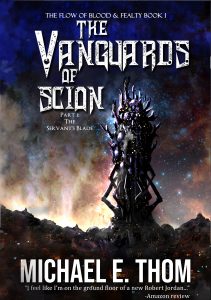 This is a shortish book and it’s in a hurry so I breezed through the first 20% in under an hour. It’s only the second SPFBO entry I’ve seen that has gone beyond the convention of a nicely illustrated map to include illustrations of the main characters, which adds a certain distinctiveness to the book. It has quite a large cast with each chapter presented through a different point of view character, none of whom have met each other by the time I got to the 21% mark. However, several of them have met a shadowy crowned figure who has come through some portal connection from another world to recruit the characters to be members of his eponymous vanguard of scion. His intention seems to be to conquer this new (to him) world and he seems to have picked a rather uninspiring bunch of near-failures somewhat down on their luck. He gives each of them a different special power, as though the fantastic four had been crossed with the magnificent seven. That said, I’m kind of thinking we’re not on the side of the good guys in this one.
This is a shortish book and it’s in a hurry so I breezed through the first 20% in under an hour. It’s only the second SPFBO entry I’ve seen that has gone beyond the convention of a nicely illustrated map to include illustrations of the main characters, which adds a certain distinctiveness to the book. It has quite a large cast with each chapter presented through a different point of view character, none of whom have met each other by the time I got to the 21% mark. However, several of them have met a shadowy crowned figure who has come through some portal connection from another world to recruit the characters to be members of his eponymous vanguard of scion. His intention seems to be to conquer this new (to him) world and he seems to have picked a rather uninspiring bunch of near-failures somewhat down on their luck. He gives each of them a different special power, as though the fantastic four had been crossed with the magnificent seven. That said, I’m kind of thinking we’re not on the side of the good guys in this one.
It does seem to be in a hurry to tell the story, throwing details out in a telly rather than a showy way. For example, one character meets an early death and rather than being shown why we should care about him before his death, we get told why after he’s dead, as the thoughts of his companion run through the dead one’s backstory and how sad his death is. There are some interesting species, though the diminutive milg with a fondness for thievery and shiny things feel a bit like bad hobbits. The prose jars on occasion e.g. when a decapitated caribou head “wriggles” through the air. There is also a coarseness to some characters that feels overplayed and a bit off – eg a character who pulls her sword out her victim’s taint (a bodily reference I only recently had explained to me). the same character vows to stab her sister “in the c*nt”, has a pet racoon more capable than skippy the kangaroo, and – having stripped off her top armour- notes “it felt good to feel the air on what little breasts she had.” The story rattles along at pace – I did read past 20% just to see how the chapter was ending – however, the overall tone, prose and style didn’t make me keen enough to read much further on.
Belle:
I really don’t have much to say about this one – there was a comment made by one character early on in the book implying that menstruation is uncouth, and it really turned me off wanting to read any further. I appreciate wanting to show a variety of characters and perspectives, but this kind of thing is not something I want to read about.
Peter:
This was quite a short book, but it really interested me. Why? Because the characters are based on D&D creations by the author and you can see some influences from other writers and stories. I was quite interested to dive into this, as D&D inspired stories can produce some wonderful books. This one takes the idea of a powerful being recruiting 5 desperate individuals into a group called Scion’s Vanguard. It used an interesting short story format to introduce the characters. I liked the touches of where the characters are with graphics but I think the book missed an opportunity of really fleshing out the characters’ back stories here. The cast of characters was well drawn, it was varied and they are all distinct from one another. The short story format though led me to be disconnected from the story, it held promise but it was this aspect that led me to not going any further. However D&D has a very special place in my heart, so I won’t be unopposed to reading this to see how things progress.
Scarlett:
The characters in The Vanguards of Scion are based on D&D characters created by the author’s family and influenced by readings of the works of King, Erickson, and R.R. Martin. This sounds really exciting in terms of all aspects of the storytelling from the setting and the narrative, to the characters and the worldbuilding…it had me intrigued to dive in.
In another dimension, in a world named the East Realm, 5 very different people struggling with one thing or another, are recruited by a very persuasive cloaked figure to become part of King Scion’s vanguard. In a sort of short-story manner, we are introduced via changing pov’s to the ex-knight Ivanos, Emmanora the rogue assassin, young Vendronia the blood child, Kazimir the alchemist teacher, and young Aeile, desperate to save her ailing sister. In a sense, each of their introductions ends similarly with the option to walk away from their current lives, though not really by choice. They seem to have been handpicked and none of them know each other or have met up to this point.
What I enjoyed and appreciated was a graphic of each of the characters at the beginning of their turn and a map in the front of the book of East Realm.
I can tell some of the writer’s influences reflected in the writing, though at some moments, the choice of convenience to wrap up each story took precedence over fleshing out the characterization. I enjoyed the cast for its variety, but it read a bit like a short story collection with the same denominator to me. It left me a bit disconnected I must say, and as Theo had pointed out there was some situational overplay that stood out.
Overall this was a lower-middle ground to me in terms of rating it, though I am not opposed to reading a bit more to see how it all comes together.
Calvin:
The Vanguards of Scion is another one that has an intriguing concept for me. The eponymous Scion–whom I assume to be the big bad–steps into the world of the story to recruit his titular Vanguard. He has managed to pick folks who seem like failures or otherwise are down on their luck and perhaps more than a little desperate. There’s definitely the possibility of some fascinating anti-hero antics. However, once again, the prose ended up being too rough to ever allow me to really immerse myself in the story. From odd turns of phrase to dialog that seemed to oscillate between overly formal and entirely informal, I never felt like I could just enjoy the story. Added on to this, in the first several chapters it felt like characters made decisions out of plot convenience rather than any clear motivation. Perhaps their character traits and motivations would become more clear later in the story, but the book moves at a rather quick pace. In addition to character decisions for plot convenience, there’s also an early fight scene where a viewpoint character manages to fight with a knife in her shoulder and blood “pouring” down her front. There appear to be no ill effects to this blood loss. All of these factors mean this one just didn’t work for me, unfortunately.
And so our quarter-finalists are
Illborn by Daniel T. Jackson and Legacy of Flame by Rebecca Bapaye
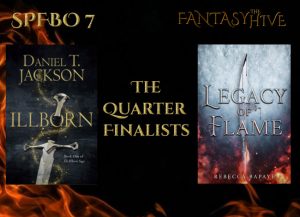
Links:
Week 1 ‘Our World’: Meet the Batch | Eliminations | Quarter-finals

[…] 2 ‘Epic’: Meet the Batch | Eliminations […]